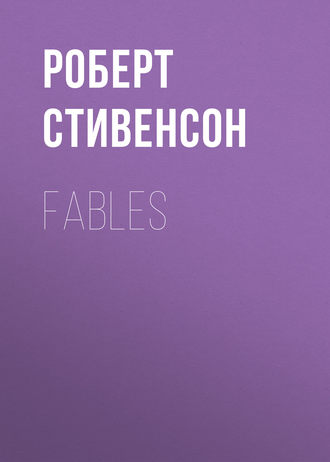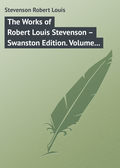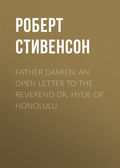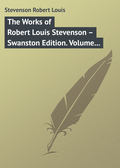
Роберт Льюис Стивенсон
Fables
III – THE TWO MATCHES
One day there was a traveller in the woods in California, in the dry season, when the Trades were blowing strong. He had ridden a long way, and he was tired and hungry, and dismounted from his horse to smoke a pipe. But when he felt in his pocket he found but two matches. He struck the first, and it would not light.
“Here is a pretty state of things!” said the traveller. “Dying for a smoke; only one match left; and that certain to miss fire! Was there ever a creature so unfortunate? And yet,” thought the traveller, “suppose I light this match, and smoke my pipe, and shake out the dottle here in the grass – the grass might catch on fire, for it is dry like tinder; and while I snatch out the flames in front, they might evade and run behind me, and seize upon yon bush of poison oak; before I could reach it, that would have blazed up; over the bush I see a pine tree hung with moss; that too would fly in fire upon the instant to its topmost bough; and the flame of that long torch – how would the trade wind take and brandish that through the inflammable forest! I hear this dell roar in a moment with the joint voice of wind and fire, I see myself gallop for my soul, and the flying conflagration chase and outflank me through the hills; I see this pleasant forest burn for days, and the cattle roasted, and the springs dried up, and the farmer ruined, and his children cast upon the world. What a world hangs upon this moment!”
With that he struck the match, and it missed fire.
“Thank God!” said the traveller, and put his pipe in his pocket.
IV. – THE SICK MAN AND THE FIREMAN
There was once a sick man in a burning house, to whom there entered a fireman.
“Do not save me,” said the sick man. “Save those who are strong.”
“Will you kindly tell me why?” inquired the fireman, for he was a civil fellow.
“Nothing could possibly be fairer,” said the sick man. “The strong should be preferred in all cases, because they are of more service in the world.”
The fireman pondered a while, for he was a man of some philosophy. “Granted,” said he at last, as apart of the roof fell in; “but for the sake of conversation, what would you lay down as the proper service of the strong?”
“Nothing can possibly be easier,” returned the sick man; “the proper service of the strong is to help the weak.”
Again the fireman reflected, for there was nothing hasty about this excellent creature. “I could forgive you being sick,” he said at last, as a portion of the wall fell out, “but I cannot bear your being such a fool.” And with that he heaved up his fireman’s axe, for he was eminently just, and clove the sick man to the bed.
V. – THE DEVIL AND THE INNKEEPER
Once upon a time the devil stayed at an inn, where no one knew him, for they were people whose education had been neglected. He was bent on mischief, and for a time kept everybody by the ears. But at last the innkeeper set a watch upon the devil and took him in the fact.
The innkeeper got a rope’s end.
“Now I am going to thrash you,” said the innkeeper.
“You have no right to be angry with me,” said the devil. “I am only the devil, and it is my nature to do wrong.”
“Is that so?” asked the innkeeper.
“Fact, I assure you,” said the devil.
“You really cannot help doing ill?” asked the innkeeper.
“Not in the smallest,” said the devil; “it would be useless cruelty to thrash a thing like me.”
“It would indeed,” said the innkeeper.
And he made a noose and hanged the devil.
“There!” said the innkeeper.
VI. – THE PENITENT
A man met a lad weeping. “What do you weep for?” he asked.
“I am weeping for my sins,” said the lad.
“You must have little to do,” said the man.
The next day they met again. Once more the lad was weeping. “Why do you weep now?” asked the man.
“I am weeping because I have nothing to eat,” said the lad.
“I thought it would come to that,” said the man.
VII. – THE YELLOW PAINT
In a certain city there lived a physician who sold yellow paint. This was of so singular a virtue that whoso was bedaubed with it from head to heel was set free from the dangers of life, and the bondage of sin, and the fear of death for ever. So the physician said in his prospectus; and so said all the citizens in the city; and there was nothing more urgent in men’s hearts than to be properly painted themselves, and nothing they took more delight in than to see others painted. There was in the same city a young man of a very good family but of a somewhat reckless life, who had reached the age of manhood, and would have nothing to say to the paint: “To-morrow was soon enough,” said he; and when the morrow came he would still put it off. She might have continued to do until his death; only, he had a friend of about his own age and much of his own manners; and this youth, taking a walk in the public street, with not one fleck of paint upon his body, was suddenly run down by a water-cart and cut off in the heyday of his nakedness. This shook the other to the soul; so that I never beheld a man more earnest to be painted; and on the very same evening, in the presence of all his family, to appropriate music, and himself weeping aloud, he received three complete coats and a touch of varnish on the top. The physician (who was himself affected even to tears) protested he had never done a job so thorough.
Some two months afterwards, the young man was carried on a stretcher to the physician’s house.
“What is the meaning of this?” he cried, as soon as the door was opened. “I was to be set free from all the dangers of life; and here have I been run down by that self-same water-cart, and my leg is broken.”
“Dear me!” said the physician. “This is very sad. But I perceive I must explain to you the action of my paint. A broken bone is a mighty small affair at the worst of it; and it belongs to a class of accident to which my paint is quite inapplicable. Sin, my dear young friend, sin is the sole calamity that a wise man should apprehend; it is against sin that I have fitted you out; and when you come to be tempted, you will give me news of my paint.”
“Oh!” said the young man, “I did not understand that, and it seems rather disappointing. But I have no doubt all is for the best; and in the meanwhile, I shall be obliged to you if you will set my leg.”
“That is none of my business,” said the physician; “but if your bearers will carry you round the corner to the surgeon’s, I feel sure he will afford relief.”
Some three years later, the young man came running to the physician’s house in a great perturbation. “What is the meaning of this?” he cried. “Here was I to be set free from the bondage of sin; and I have just committed forgery, arson and murder.”
“Dear me,” said the physician. “This is very serious. Off with your clothes at once.” And as soon as the young man had stripped, he examined him from head to foot. “No,” he cried with great relief, “there is not a flake broken. Cheer up, my young friend, your paint is as good as new.”
“Good God!” cried the young man, “and what then can be the use of it?”
“Why,” said the physician, “I perceive I must explain to you the nature of the action of my paint. It does not exactly prevent sin; it extenuates instead the painful consequences. It is not so much for this world, as for the next; it is not against life; in short, it is against death that I have fitted you out. And when you come to die, you will give me news of my paint.”
“Oh!” cried the young man, “I had not understood that, and it seems a little disappointing. But there is no doubt all is for the best: and in the meanwhile, I shall be obliged if you will help me to undo the evil I have brought on innocent persons.”
“That is none of my business,” said the physician; “but if you will go round the corner to the police office, I feel sure it will afford you relief to give yourself up.”
Six weeks later, the physician was called to the town gaol.
“What is the meaning of this?” cried the young man. “Here am I literally crusted with your paint; and I have broken my leg, and committed all the crimes in the calendar, and must be hanged to-morrow; and am in the meanwhile in a fear so extreme that I lack words to picture it.”
“Dear me,” said the physician. “This is really amazing. Well, well; perhaps, if you had not been painted, you would have been more frightened still.”
VIII. – THE HOUSE OF ELD
So soon as the child began to speak, the gyve was riveted; and the boys and girls limped about their play like convicts. Doubtless it was more pitiable to see and more painful to bear in youth; but even the grown folk, besides being very unhandy on their feet, were often sick with ulcers.
About the time when Jack was ten years old, many strangers began to journey through that country. These he beheld going lightly by on the long roads, and the thing amazed him. “I wonder how it comes,” he asked, “that all these strangers are so quick afoot, and we must drag about our fetter?”
“My dear boy,” said his uncle, the catechist, “do not complain about your fetter, for it is the only thing that makes life worth living. None are happy, none are good, none are respectable, that are not gyved like us. And I must tell you, besides, it is very dangerous talk. If you grumble of your iron, you will have no luck; if ever you take it off, you will be instantly smitten by a thunderbolt.”
“Are there no thunderbolts for these strangers?” asked Jack.
“Jupiter is longsuffering to the benighted,” returned the catechist.
“Upon my word, I could wish I had been less fortunate,” said Jack. “For if I had been born benighted, I might now be going free; and it cannot be denied the iron is inconvenient, and the ulcer hurts.”
“Ah!” cried his uncle, “do not envy the heathen! Theirs is a sad lot! Ah, poor souls, if they but knew the joys of being fettered! Poor souls, my heart yearns for them. But the truth is they are vile, odious, insolent, ill-conditioned, stinking brutes, not truly human – for what is a man without a fetter? – and you cannot be too particular not to touch or speak with them.”
After this talk, the child would never pass one of the unfettered on the road but what he spat at him and called him names, which was the practice of the children in that part.
It chanced one day, when he was fifteen, he went into the woods, and the ulcer pained him. It was a fair day, with a blue sky; all the birds were singing; but Jack nursed his foot. Presently, another song began; it sounded like the singing of a person, only far more gay; at the same time there was a beating on the earth. Jack put aside the leaves; and there was a lad of his own village, leaping, and dancing and singing to himself in a green dell; and on the grass beside him lay the dancer’s iron.
“Oh!” cried Jack, “you have your fetter off!”
“For God’s sake, don’t tell your uncle!” cried the lad.
“If you fear my uncle,” returned Jack “why do you not fear the thunderbolt”?
“That is only an old wives’ tale,” said the other. “It is only told to children. Scores of us come here among the woods and dance for nights together, and are none the worse.”
This put Jack in a thousand new thoughts. He was a grave lad; he had no mind to dance himself; he wore his fetter manfully, and tended his ulcer without complaint. But he loved the less to be deceived or to see others cheated. He began to lie in wait for heathen travellers, at covert parts of the road, and in the dusk of the day, so that he might speak with them unseen; and these were greatly taken with their wayside questioner, and told him things of weight. The wearing of gyves (they said) was no command of Jupiter’s. It was the contrivance of a white-faced thing, a sorcerer, that dwelt in that country in the Wood of Eld. He was one like Glaucus that could change his shape, yet he could be always told; for when he was crossed, he gobbled like a turkey. He had three lives; but the third smiting would make an end of him indeed; and with that his house of sorcery would vanish, the gyves fall, and the villagers take hands and dance like children.
“And in your country?” Jack would ask.
But at this the travellers, with one accord, would put him off; until Jack began to suppose there was no land entirely happy. Or, if there were, it must be one that kept its folk at home; which was natural enough.
But the case of the gyves weighed upon him. The sight of the children limping stuck in his eyes; the groans of such as dressed their ulcers haunted him. And it came at last in his mind that he was born to free them.
There was in that village a sword of heavenly forgery, beaten upon Vulcan’s anvil. It was never used but in the temple, and then the flat of it only; and it hung on a nail by the catechist’s chimney. Early one night, Jack rose, and took the sword, and was gone out of the house and the village in the darkness.
All night he walked at a venture; and when day came, he met strangers going to the fields. Then he asked after the Wood of Eld and the house of sorcery; and one said north, and one south; until Jack saw that they deceived him. So then, when he asked his way of any man, he showed the bright sword naked; and at that the gyve on the man’s ankle rang, and answered in his stead; and the word was still Straight on. But the man, when his gyve spoke, spat and struck at Jack, and threw stones at him as he went away; so that his head was broken.
So he came to that wood, and entered in, and he was aware of a house in a low place, where funguses grew, and the trees met, and the steaming of the marsh arose about it like a smoke. It was a fine house, and a very rambling; some parts of it were ancient like the hills, and some but of yesterday, and none finished; and all the ends of it were open, so that you could go in from every side. Yet it was in good repair, and all the chimneys smoked.







